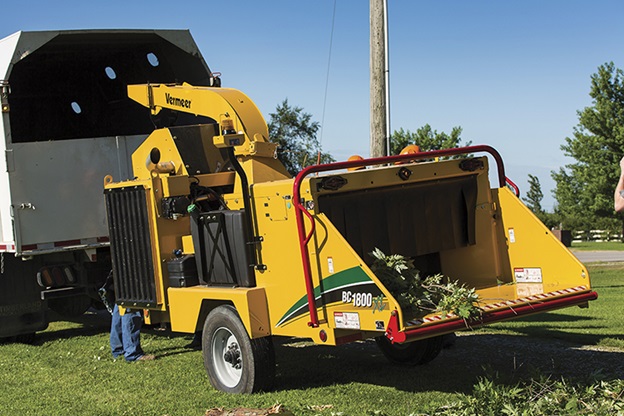When it comes to efficient wood management on commercial sites, selecting the right commercial wood chipper is crucial. These powerful machines are designed to reduce large volumes of wood into smaller, more manageable chips, which can be used for landscaping, mulch, or even biofuel. However, with various models and features available, choosing the right chipper for your needs can be daunting. Here are some key factors to consider to ensure you maximise your investment.
1. Type of Wood Chipper
There are primarily three types of wood chippers: disc chippers, drum chippers, and screw chippers. Each type comes with its own advantages and is suitable for different kinds of wood processing jobs:
- Disc Chippers: These chippers use a steel disc with blades mounted on it to chip the wood. They are known for their precision and are ideal for creating uniform wood chips.
- Drum Chippers: Equipped with a large drum integrated with blades, these chippers are efficient for processing large volumes of wood quickly. They are typically used for clearing large areas or for commercial forestry operations.
- Screw Chippers: These use a cone-shaped screw to compress and grind the wood into chips. Screw chippers are less common but are excellent for producing finely ground chips.
2. Power and Size
The size and power of the chipper determine what kind of wood it can handle and how quickly it can operate. Commercial wood chippers range from small, portable units to large, industrial-grade machines. Consider the following:
- Engine Power: More horsepower means the ability to chip larger branches and trunks quickly. Evaluate the average size of the wood you need to process to decide on the engine power required.
- Capacity: Check the maximum diameter of wood the chipper can handle. This is crucial for industrial operations where handling large limbs and trunks is common.
3. Ease of Use and Mobility
For commercial operations, where moving the chipper between sites might be necessary, mobility is a key consideration:
- Portability: If the job requires frequent moving, look for chippers with trailer mounts.
- Manoeuvrability: Consider the weight and size of the chipper, especially if you will need to operate in tight spaces or uneven terrain.
4. Reduction Ratio
The reduction ratio indicates how effectively the wood chipper breaks down branches and debris. A higher ratio means more reduction, resulting in finer wood chips. This is particularly important if the chips are intended for sale or precise applications like mulching around plants.
5. Safety Features
Given the dangerous nature of wood chipping, safety cannot be overlooked. Ensure the wood chipper has features such as:
- Emergency stops: Quick access to stop operations can prevent accidents.
- Shielding around moving parts: To protect operators from flying debris.
- Reversing capability: To clear jams without putting operators at risk.
6. Durability and Maintenance
Commercial wood chippers are a significant investment, and their durability directly impacts their value. Look for chippers constructed with high-quality materials able to withstand heavy use. Additionally, consider the maintenance aspect:
- Ease of maintenance: Ensure that parts such as blades and filters are easily accessible.
- Availability of parts: Check the availability of spare parts and the support network of the manufacturer.
7. Cost Effectiveness
Lastly, balance your upfront budget with long-term operational costs. While cheaper models might save you money initially, they could have higher maintenance costs and lower efficiency. Consider models that offer good fuel efficiency and low repair frequencies to reduce ongoing expenses.
Conclusion
Choosing the right commercial wood chipper involves balancing various factors, including the type of chipper, power requirements, ease of use, safety features, and cost. By carefully assessing your needs and understanding the specifications of different chippers, you can select a model that not only meets your operational requirements but also enhances safety and productivity on commercial projects. Always remember to consult with experts and manufacturers to make the most informed decision, ensuring that your investment contributes positively to your business’s efficiency and bottom line.


Comments are closed.